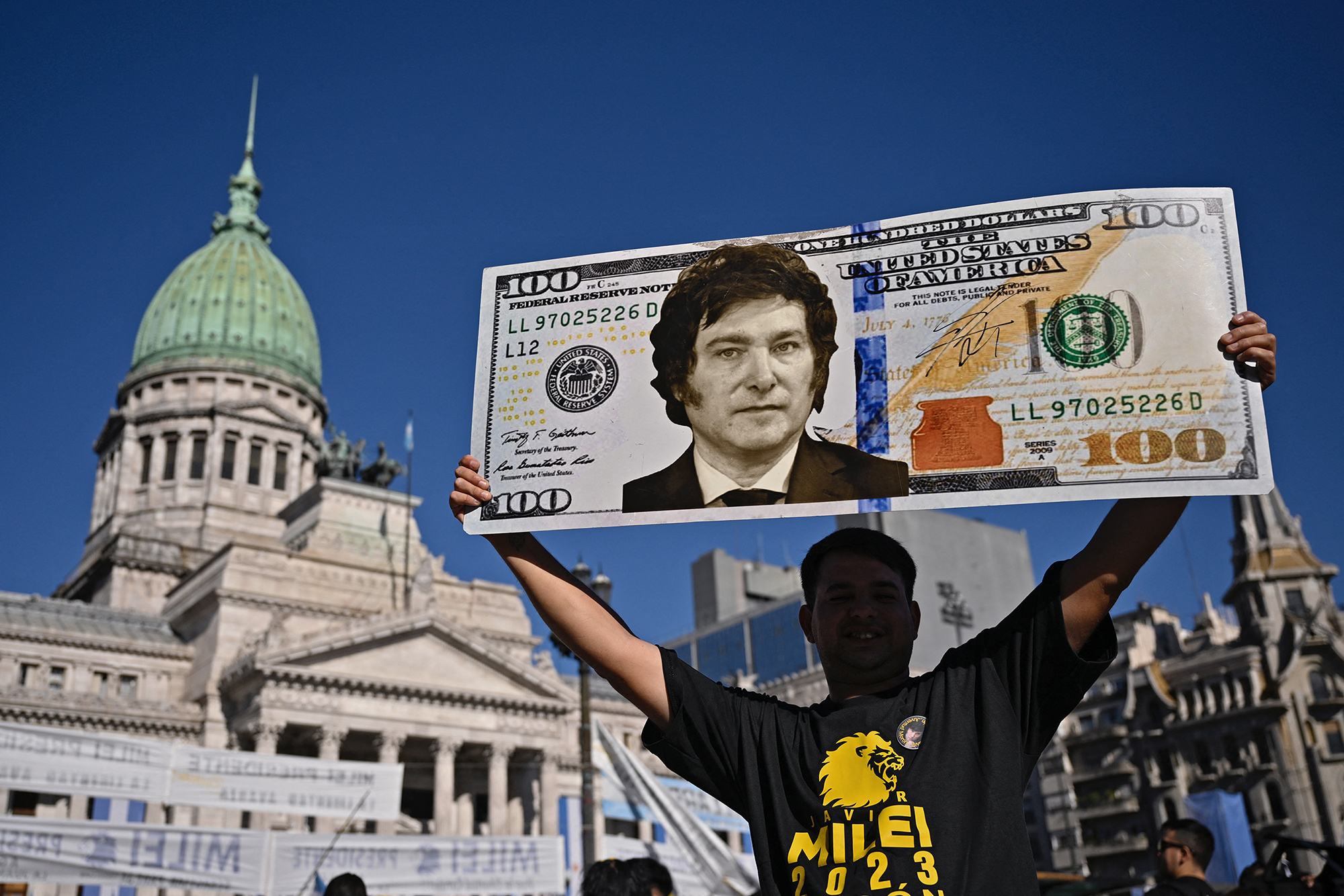Former U.S. President Donald Trump has introduced a proposal to eliminate visa restrictions for Argentine nationals, signaling support for the conservative leadership of Argentina’s President Javier Milei. This announcement comes at a politically charged moment, reinforcing Trump’s alignment with like-minded populist figures abroad and illustrating shifting priorities in U.S.-Argentina relations.
Trump’s proposal suggests a significant policy shift: granting Argentina more favorable access to travel and immigration into the United States. While specifics are still emerging, the move is framed as a gesture of goodwill toward Milei’s administration, characterized by its strong right-wing stance and emphasis on deregulation, economic liberalization, and confrontation with leftist politics in Latin America.
The timing of the proposal is critical. Milei, who took office amid high inflation and public discontent, has pursued aggressive reforms designed to reshape Argentina’s economy. His brand of politics—marked by blunt rhetoric, free-market advocacy, and nationalist themes—has attracted both fervent followers and sharp critics. Trump’s public alignment with Milei thus reinforces shared ideological principles and cements geopolitical connections within the international conservative bloc.
Trump’s declaration highlights two main objectives: simplifying travel restrictions and enhancing political alignment. He referred to Argentina as a nation experiencing significant political transformation, implying that altering visa policies would symbolize U.S. acknowledgment of reform initiatives. Although some critics warn against using visa policy as a form of diplomatic incentive, Trump portrayed the plan as a tactical action to back shared political principles and regional sway.
The announcement underscores broader themes in contemporary U.S. foreign policy discourse. Trump has increasingly leaned toward transactional diplomacy—offering incentives or punishments tied to political alignment or policy preferences. In this case, the proposal binds immigration policy to ideological cooperation, a marked departure from traditional visa considerations based on family, education, employment, or humanitarian need.
Opinions in Argentina are divided. Milei’s proponents perceive the move as worldwide recognition, a clear indication that the nation’s move towards economic liberalism and conservative leadership is gaining acknowledgment from major players overseas. Some Argentine legislators shared that perspective, calling the proposal a positive chance to strengthen bilateral relations and enhance cultural exchanges.
Detractors, however, voiced concern over the potential precedent such a policy sets. Critics argue that linking visas to political ideology undermines immigration’s humanitarian and meritocratic principles. They raise questions about what other foreign political figures might seek similar deals and whether U.S. immigration policy risks becoming a tool of partisan foreign intervention.
Analysts are equally vigilant about legal and procedural challenges. Visa requirements are determined by national legislation and necessitate collaboration among multiple departments such as the State Department and Department of Homeland Security. Instituting broad visa waivers or expedited entry for Argentine passport holders would also necessitate Congressional examination or adjustments to administrative processes—measures that are not immediate or assured.
Beyond diplomatic appearances, the suggested change could have economic effects. Simplified travel from Argentina might positively impact areas like tourism, business investments, and academic exchanges. Businesspeople, learners, and innovators could find it easier to enter U.S. markets and explore educational opportunities. On the other hand, worries persist about potential negative outcomes, such as impacts on the job market or difficulties in maintaining security, if screening procedures are loosened or exemptions are widely granted.
The broader context of the declaration indicates growing synergy among populist figures in both the Americas. Milei’s leadership in Argentina mirrors Trump’s political approach: assertive nationalism, anti-establishment rhetoric, and creating division in political discussions. Trump’s gesture of offering visa flexibility signals similar regional movements, promoting cross-border partnerships rooted in shared ideology over customary diplomacy.
Within U.S. politics, the proposal is being closely watched across partisan lines. Some Republican figures praised the move as principled support for international conservatives and a step toward countering left-leaning influence in Latin America. They see the policy as an extension of domestic cultural politics into global alliance-building.
Democrats, however, have expressed concern that immigration policy should remain separate from geopolitical maneuvering. They argue that visa access is a matter of law and process—not a tool for rewarding political allies. Lawmakers from both parties also pointed to the importance of preserving fairness and uniform standards for all applicants, warning against precedent that could erode public trust in the immigration system.
Advocates for human rights have introduced a new perspective to the discussion. Although they acknowledge Argentina’s democratic validity, they warn that linking visa benefits to particular administrations might reduce accountability. A neutral stance in immigration policies enables the United States to uphold firm standpoints on human rights, concerns about the rule of law, or issues of electoral integrity—values that could be jeopardized if citizenship benefits turn into political incentives.
As debate continues, practical questions remain unanswered. How would visa relaxation be structured? Would it apply broadly or target specific groups such as business travelers, students, or cultural exchange participants? What oversight mechanisms would guard against abuse, fraud, or evasion? And would the measure be reversible if Argentina’s political direction shifts or domestic conditions deteriorate?
One potential strategy involves a gradual rollout, beginning with pilot initiatives for educational or work visas, then expanding gradually according to compliance and administrative evaluations. An alternative strategy might involve forming regional immigration agreements within the Americas, suggesting mutual access arrangements under specifically outlined criteria. Every situation involves compromises between diplomatic signaling, legal practicality, and managing risk.
In a broader perspective, Trump’s initiative signifies more than just friendly relations between two countries—it embodies a contemporary technique of soft power. Instead of depending solely on financial assistance or multilateral institutional involvement, officials are exploring immigration policies as a means of exerting influence. Experts note that these methods might integrate into a wider strategy, utilizing visa benefits, access to markets, or regulatory leniency as methods to cultivate international ideological alliances.
Critically, the announcement underscores the evolving landscape of global populism. With leaders like Trump in the U.S. and Milei in Argentina embracing anti-globalist rhetoric and economic nationalism, visa policy becomes an arena for signaling affinity. For grassroots supporters, visa liberalization might symbolize ideological success; for critics, it suggests a blurring of lines between immigration adjudication and partisan politics.
As the discourse unfolds, attention will turn to legislative actions, procedural decisions within the White House and agencies, and public response on both sides of the hemisphere. Will Trump’s proposal see formal adoption, and if so, in what form? How will Argentina respond from Milei’s administration? And how might other nations seek to replicate or resist such political immigration incentives?
The outcome of this proposal may shape broader norms about the role of ideology in immigration policy—whether supporting allied political movements through visa access becomes a recurring strategy or remains a political novelty. For now, Trump’s announcement marks a bold intersection of domestic political commentary and international diplomacy—a clear testament to how leadership figures may seek to reimagine traditional policy tools in service of aligned ideology.
Donald Trump’s proposal to ease visa limitations for Argentina indicates strong commendation for Javier Milei’s administration while also prompting important inquiries regarding the influence of immigration policy on ideological diplomacy. Regardless of whether the initiative transitions into a formal policy or stays merely symbolic, it highlights an increasing pattern: the merging of immigration choices with political identity and worldwide partisanship.




